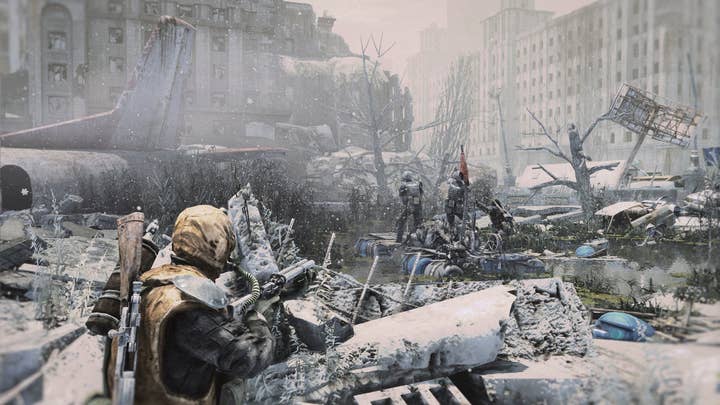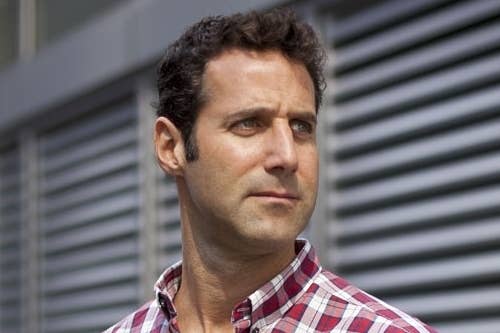Jason Rubin: Metro: Last Light is the "triumph of an underdog"
Former THQ exec details terrible working conditions for developer 4A Games and "irrational requirements" of THQ
Jason Rubin is best known as the co-founder of leading game developer Naughty Dog. More recently, however, he had the thankless task of trying to overhaul struggling publisher THQ. Rubin joined THQ in May 2012 and while he made a valiant effort to improve the company, the bad momentum was too much and he didn't have enough time to steer the ship away from the iceberg.
As president of THQ, Rubin oversaw numerous studios, including the talented folks at 4A Games, known for the Metro franchise. THQ was to be the publisher for Metro: Last Light until its unfortunate demise. Instead, Koch Media picked up the rights for almost $6 million earlier this year. In this fascinating article from Rubin, the former THQ executive details the awful working conditions that the studio in the Ukraine had to face during the development of Last Light, and he argues that gamers and the industry at large should recognize what 4A was able to accomplish despite major hurdles and adversity.
Here's Rubin's story, submitted exclusively to GamesIndustry International
It is unfortunate that Prof [Creative Director Andrew Prokhorov], Dean Sharpe, and the rest of the team at 4A won't receive appropriate credit for their achievement in releasing Metro: Last Light.
A combination of a complex and secretive industry, a press that lags the movie and music press in calling attention to the stories behind the games, a dysfunctional and ever-changing sequence of producers causing confusion, the inevitable anonymity that comes from being an Eastern European developer, and a new, last minute publisher that doesn't see the upside in doing your team's publicity, will conspire to keep an incredible story hidden.
I am going to try and change that.
To be clear, nothing in this missive should suggest that either 4A or I would like to see any change in the way the game itself has been received or reviewed by press or fans. I know 4A well enough to know that they demand to contest on a level playing field. This isn't golf, and they don't need or want a handicap. Their pride and skill demand that Last Light go head to head with competition on even terms, and I am sure they are happy with the response.
But now that reviews are mainly behind us, I think it's worth looking deeper.
"4A's staff sat on folding wedding chairs, literally elbow to elbow at card tables in what looks more like a packed grade school cafeteria than a development studio"
Let's be honest: 4A was never playing on a level field. The budget of Last Light is less than some of its competitors spend on cut scenes, a mere 10 percent of the budget of its biggest competitors. Yet it is lauded for its story and atmosphere. It is built on a completely original and proprietary second-generation engine that competes with sequels that have stopped numbering themselves, with more engineers on their tech than 4A has on the entire project. Yet its tech chops are never in question.
And all of this is compounded by the conditions this Ukrainian team works under in Kiev. The entire 4A studio would fit easily in the (underutilized) gym at EA Los Angeles' offices. Yet Last Light's Metacritic score blows away Medal of Honor Warfighter. As undeniably fantastic as competitor BioShock Infinite may be, the team was given whatever resources they needed to make the title. At the same time, 4A's staff sat on folding wedding chairs, literally elbow to elbow at card tables in what looks more like a packed grade school cafeteria than a development studio.

When 4A needed another dev kit, or high-end PC, or whatever, someone from 4A had to fly to the States and sneak it back to the Ukraine in a backpack lest it be "seized" at the border by thieving customs officials. After visiting the team I wanted to buy them Aeron office chairs, considered a fundamental human right in the west. There were no outlets in the Ukraine, and our only option was to pack a truck in Poland and try to find an "expediter" to help bribe its way down to Kiev. We gave up not because this tripled the cost, but because we realized that the wider Aeron chairs would require spreading out people and computers, which would lead to extra desks, and that ultimately would have required bigger offices. Yes, really.
I truly enjoyed Far Cry 3, which deserved its great reviews. But how many times did Ubisoft Montreal lose power for hours or days during development? Power outages are the norm for 4A. All developers have deadlines, but I know of few that had to bring in construction generators to be able to work the weekend before final submission because an extra day meant missing shelf dates by weeks. Montreal is cold, but when it gets cold in Kiev it's different. That's because the government provides all of the heating through a central coal burning facility that pipes hot water to homes and offices. Unfortunately, it breaks down reliably a few times a year for a week at a time. Then 4A works in their parkas and struggles to keep their fingers warm in temperatures well below freezing. That is unless it snows and they get stuck home for a few days at a time because snow clearing isn't up to Western standards.
The only thing for which 4A is getting more credit than I think they deserve is the creativity behind the ever frightening, dark, post apocalyptic environment of the game. I've been in Kiev to visit the team, so I know they just stepped outside for reference.
That last paragraph is a humorous exaggeration, of course, but there's truth behind the lie. One evening when Dean Sharpe arrived at his apartment after a long day at the office a dangerous looking Georgian man and his three-car armed entourage greeted him. Dean was told that, lease be damned, he had a day to clear out and find a new apartment.
So there were challenges - why should we care?
"If 4A had been given a more competitive budget, in a saner environment, hadn't wasted a year-plus chasing the irrational requirement of THQ's original producers...what could 4A have created?"
Though any gamer can enjoy Last Light without the backstory, I think the backstory makes it that much sweeter. It is interesting enough that Pele was perhaps the greatest football player of all time. But it is even more interesting when we find out that he learned to play bare footed because he couldn't afford to buy shoes. The Jeremy Lin story was interesting, but so much more so when you find out that he received no scholarship offers out of high school, was undrafted, and played sparingly before he hit headlines.
If you care about the art of making games then you have to care about more than the final product. The struggle and the journey becomes part of the story. Like sport, you cheer when the underdog comes from behind, and triumphs in the face of incredible odds.
That doesn't always mean getting the gold. Sometimes when the underdog comes in second, third, or fourth, it is ultimately more impressive than the story of the inevitable number one. 4A is to developers what the Jamaican Bobsledding team is to Olympic sport. The Jamaicans may not have won the gold in 1994, but they beat the Americans who had far more going for them... like winter coats and bobsledding tracks to train on.
According to professional third-party game rating estimation groups, this year titles will find themselves with a 3-5 point Metacritic deduction versus the same game two years ago due to the maturity and fatigue in the console cycle. But even without adding those points back in achieving an 80+ score this year for Last Light, accounting for the budget and adversity that the team faced, and considering the size and talent of the teams they are competing with, is a stunning achievement.
It is a true testament to the raw skill and potential of the team. Ultimately, it is a desire for the recognition of 4A's talent that drove me to write this. You may know that I have a history of talking about developer recognition. These guys need recognition.
If 4A had been given a more competitive budget, in a saner environment, hadn't wasted a year-plus chasing the irrational requirement of THQ's original producers to fit multiplayer and co-op into the same deadline and budget(!), hadn't had to deal with the transition to a new publisher in the crucial few months before final, what could 4A have created?
I can only imagine, and I am looking forward to playing it.
You can follow Jason Rubin on Twitter @Jason_Rubin

